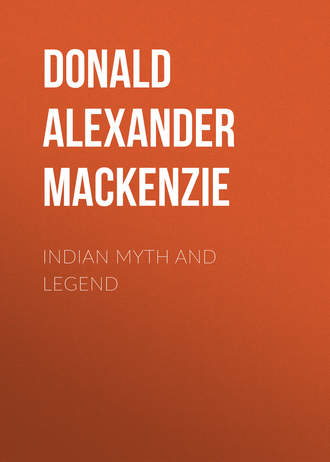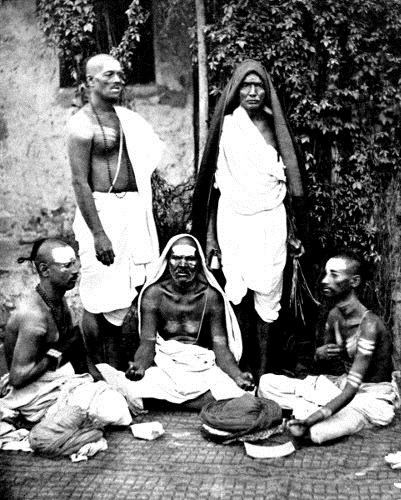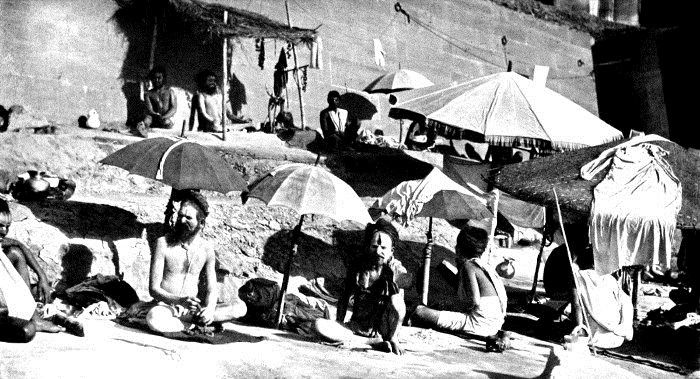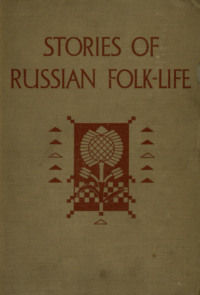 полная версия
полная версияIndian Myth and Legend

15
Photo. Frith
GROUP OF PRESENT-DAY BRAHMANS
For the performance of some sacrifices a day of preparation might be required. Altars had to be erected with mathematical exactness; the stones were blessed and anointed; offerings were made at every stage of the work so that the various deities might give protection in their various spheres. The following extract from one of the Brahmanas affords a glimpse of the preparatory rites:—
Thrice he (the priest) perambulates it (the altar); for thrice he walks round it (whilst sprinkling); thus as many times as he walks round it, so many times does he perambulate it....
Having thereupon put that stone into the water pitcher, (he) throws it in that (south-westerly) direction, for that is Nirriti's region; he thus consigns pain to Nirriti's region....
Outside the fire altars he throws it, &c.131
Human failings may be imputed to Brahmans, but it must be recognized that the ideals of their caste were of a high order. They were supposed to be born with “spiritual lustre”, and their lives were consecrated to the instruction and uplifting of mankind and the attainment of salvation. A Brahman's life was divided into four periods. The first was the period of childhood, and the second was the period of probation, when he went to live in a forest hermitage, where he acted as the servant of a revered old sage, his spiritual father, and received instruction in Brahmanic knowledge for a number of years. During the third period the Brahman lived the worldly life; he married and reared a family and performed the duties pertaining to his caste. Hospitality was one of the chief worldly duties; if a stranger, even although he might be an enemy, came and asked for food he received it, although the Brahman family should have to fast to supply him. In the fourth period the Brahman, having proved himself a faithful husband and exemplary father, divided his worldly possessions between his grown-up sons and daughters; then he abandoned his comfortable home and, assuming the deerskin clothing of hermits, went to live in a lonely forest, or among the Himalayan mountains, to prepare for the coming of death, far away from the shadows cast by sin and sorrow. In solitude he performed rigid penances and addressed himself with single-minded devotion to the contemplation of spiritual problems. Subduing the five senses, he attained to the state of Yoga (concentration). Placing his mind entirely upon the contemplation of the soul, he became united ultimately with the World Soul (God), thus obtaining the release which was Salvation. Some Brahmans were teachers who instructed pupils and composed the sacred writings. The forest hermitages were the universities of ancient India.
The profession of the priesthood had certainly its mercenary aspect; sacrificial fees were fixed as well as sacrificial rites, and a not unimportant part of a ceremony was the offering of generous gifts to the Brahmans, who presided at the altar. But on the whole the riches thus expended were not given in vain. As in Egypt, the rise and endowment of the priestly cult was due to the accumulation of wealth which enabled a section of society to find leisure for study and the promotion of culture. Aryan civilization in India owed much to the Brahmans. They introduced and elaborated alphabetic signs; the devoted scholars among them compiled the first Sanskrit grammar and studied the art of composition. Among the hermits there were great and original thinkers who laid the basis of Indian metaphysical thought, and rose from the materialism of the early Vedic hymns to the idealism of the speculative prose works, which included the Forest Books, a name redolent of leafy solitude and of simple and contemplative lives on the banks of sweetly-flowing waters. Even their devotion to the mysteries of sacrificial ritual, which became more and more complicated, was not unproductive of permanent benefits to mankind. The necessity for the exact construction of altars, and the observance of ceremonies in due season, promoted the study of mathematical science. These Brahmans invented the numerical figures which have attained universal usage, and in time they gave the world Algebra. The influence of their culture may be traced in other directions. At the present day it has indirectly brought into existence the science of Comparative Religion.

16
SADHUS (RELIGIOUS MENDICANTS) AT BENARES
At the close of the Rigvedic period the Aryans had extended their sway to the district known as Madhyadesa, the “middle country”, between the “Five Rivers” of the Punjab and the upper reaches of the Jumna and Ganges. Pioneers were meantime pressing southward and eastward towards the sea. Migrations were, no doubt, due to propulsion as well as attraction; fresh folk-waves probably poured in periodically from the north-west, while the settled population must have increased rapidly in the fertile land controlled by the invaders, to whom the aborigines offered but slight resistance.
The second Vedic book, the Samaveda, does not contain much fresh material: it is mainly a compilation of the Rigvedic hymns which the priests chanted at the Soma sacrifice. Its sole interest, from a historical point of view, is the evidence it affords of the steady growth of ritualistic tendencies. A new era of Aryan civilization is revealed, however, by the third Veda, the Yajurveda. In this book the tribes are found to have extended their area of control down the Ganges valley, and southward along the banks of the Indus. It is of interest to note here that the word “Samudra”, first applied to the broadening Indus where it receives its tributaries, and signifying “collected waters”, became in the Brahmanas the name of the world-encircling ocean, across which in due time loomed the ships which “once in three years” carried to Solomon's order “gold, and silver, ivory (or elephants' tusks), and apes, and peacocks”.132
In the Yajurveda we find that Aryan civilization has developed greatly in the course of three or four centuries. Powerful tribes have established kingdoms, and small states are being subjected to the larger. The hardened system of social organization is reflected by the references to the four distinct castes. Hitherto the Kshatriyas have controlled the destinies of the people, but now the Brahmans achieve an intellectual conquest and impose their sway over kings and nobles. The holy men are no longer the humble servants of generous patrons; they are the human representatives of the all-controlling deities. “Verily, there are two kinds of gods; for the gods themselves, assuredly, are gods, and those priests who have studied and teach Vedic lore, are the human gods.”
The offerings to the deities are “consecrated by the feeding of priests”.133
Even the gods become dependent upon the priests, who provided them by offering sacrifices with the “food” they required, and also with the Soma which gave them length of years. Indra could not combat against the Asuras without the assistance of the priests who chanted formulas to ensure victory; it was, therefore, due to the power exercised, in the first place, by the priests that the drought demon was overcome and rain fell in abundance.

17
A YOGI ON A BED OF SPIKES
An example of present-day austerities
Priests might also accumulate in heaven credit balances of Celestial power by undergoing penances for long periods. A heavy debt was also due to them by the gods for their sacrificial offerings. When a Brahman desired to exercise his accumulated power, he might even depose the deities, who were therefore placed under compulsion to fulfil his demands; his Celestial credit might exceed the “paying” possibilities of the supreme Powers. In the sacred tales Brahmans were credited with performing rigid penances for centuries.
In the fourth Veda, the Atharva-veda, the revival of belief in formulas is emphasized. This book, which did not receive recognition as an inspired work at first, is in the main a collection of metrical charms of great antiquity. Many resemble closely those which have been collected by folk-lorists during late years in the Scottish Highlands and elsewhere throughout Europe. The Rigveda hymns reveal the religious beliefs and aspirations of the advanced thinkers of their age; the Atharva-veda contains the germs of folk religion—the magical formulas chanted to dispel or invoke the vague spirits who helped or thwarted mankind. It teaches that the Universe is upheld by sacrifice and the spiritual exaltation of Brahmans, and that Brahmanic power may be exercised by the use of appropriate charms. Human beings might also be influenced by the spirits invoked by means of formulas.
Primitive man believed that all emotions were caused by spirits. When the poet sang, he was “inspired”—he drew in a spirit; ecstasy was “a standing outside of oneself”, the soul having escaped temporarily from the body. Wrath was caused by a demon, and “battle fury” by the spirit of war which possessed the warrior. When a human being was “seized” by a fit, his convulsions were believed to be caused by the demon who had entered his body. Love was inspiration in the literal sense, and an Indian lover might compel a heedless lady to regard him with favour by reciting an Atharva-vedic spell. Apparently the love spirit had a weakness for honey. The lover chanted:
Honey be mine at the tip of my tongue,May sweetness of honey pervade my speech,So that my love may come under my spell—So that my lady may yield to my will. Atharva-veda, i, 34.As the grass is shorn from earth by the wind,So may thy soul be shorn to my will,And then, O lady, thou'lt give me thy love,Nor be averse to me as thou wert. Atharva-veda, ii, 30.A lover, we find, can invoke the lady to embrace him “as the creeper embraces a tree”; if she clings to his arm he can cause her to cling to his heart; his influence over her mind is like the influence of a wing-beating eagle over the wind. It may be, too, that a neglected girl finds it necessary to prepare a love potion with “salve, sweet wood, and spikenard”, and to cause the heart of an ungallant swain to suffer from “a parching heart”, which “languishes for love”, and experiences the “yearning of the Apsaras”.
Warriors were charmed against spells, cattle and sheep were charmed against wild beasts, a house was charmed against evil spirits and demons.134 Greedy demons of disease, who devoured the flesh of patients, were greatly feared: Brahmans performed ceremonies of riddance and “plagued them as the tiger plagues the cattle owners”. The following is a charm against cough:
As the soul with the soul's desires swiftly to a distance flies,Thus do thou, O cough, fly forth along the soul's course of flight.As a well-sharpened arrow swiftly to a distance flies,Thus do thou, O cough, fly forth along the expanse of the earth.As the rays of the sun swiftly to a distance fly,Thus do thou, O cough, fly forth along the flood of the sea. Atharva-veda, vi, 105.135A Scottish Highland charm similarly invokes the Powers, or the “King of the Elements”:
To cause the wrath of men to ebb,Like to a wave from the sea to the floodtide,And a wave from the floodtide to the ebb.Occasionally a mantra is infused with high religious fervour. A Brahman might pray:
From the sins which knowingly or unknowingly we have committed, do ye, all gods, of one accord release us.
If awake or asleep, to sin inclined, I have committed a sin, may what has been, and what shall be, as if from a wooden post, release me.
Atharva-veda, vi, 115. 1-2.136Another hymn of this character concludes:
In heaven, where our righteous friends are blessed,Having cast off diseases from their bodies,From lameness free and not deformed in members,There may we see our parents and our children. Atharva-veda, vi, 120.137While the tribes were spreading southward and eastward, Madhyadesa, the “middle country”, remained the centre of Brahmanic culture. In that district came into existence the earliest sacred prose works which constitute the basis of classic Hinduism. The first were the oldest Brahmanas; these comment on and expound the doctrines of the Vedic hymns, especially in their relation to the ritual of sacrifices. To the Brahmanas were added the Aran´yakas, “forest books”, which are more speculative in tendency. The expository appendices to the Aran´yakas are called the Upanishads, “the sittings down”, or “the sessions”—the pupil sat at his master's feet—and in these a high level of thought is attained. “For the first time”, says Professor Macdonell, “we find the Absolute grasped and proclaimed.”
All the tribes were not infused with the same degree of culture. In the Yajur-veda period there were various schools of thought, and these continued to exercise their influence into historic times, even after Upanishadic doctrines became widespread.
Ere we deal, however, with the new theological doctrines of the Brahmanic teachers, we should follow the development of sacrificial practices, because from these evolved the bold Pantheism which characterized the conception of the World Soul, Brahmă.
The two greatest sacrifices were the purusha-medha, the human sacrifice, and aswa-medha, the sacrifice of the horse. Both were prevalent in early times, and in simpler form than they survive to us in the doctrinal works and the Epics. A human sacrifice was believed to be of highest potency, but it became extremely rare, as in Egypt, among the ruling and cultured classes. It was perpetuated in India, however, until about half a century ago, by the Dravidian Khonds in Bengal and Madras, and had to be suppressed by British officers. Human sacrifices, in historic times, were “offered to the earth goddess, Tari Pennu or Bera Pennu, and were believed to ensure good crops, and immunity from all diseases and accidents”. One official record states that the victim, after being stabbed by the priest, was “literally cut to pieces”. Each person who was “so fortunate as to procure it carried away a morsel of the flesh, and presented it to the idol of his own village”.138
From the practice of sacrificing human beings arose the conception that the first act of Creation was, if not human sacrifice, at least the sacrifice of the first being with human attributes. The Universe is the giant Purusha (“man”); he is “all that hath been and shall be”. In a Rigvedic hymn, which is regarded as being of later composition than the Rigvedic period, it is set forth:
“When the gods performed a sacrifice with Purusha as the oblation, the Spring was its butter, the Summer its fuel, and the Autumn its (accompanying) offering. This victim, Purusha, born in the beginning, they immolated on the sacrificial grass.”
From this universal sacrifice issued forth all that exists. The Brahman rose from Purusha's mouth, the Rajanya (Kshatriya) from his arms, the Vaisya from his thighs, and the Sudra sprang from his feet. Indra and Agni came from his mouth, and Vayu from his breath.
“When the gods, performing sacrifice, bound Purusha as a victim, there were seven sticks (stuck up) for it (around the fire).... With sacrifice the gods performed the sacrifice. These were the earliest rites.”139
“From his (Purusha's) navel arose the air, from his head the sky, from his ears the four quarters; in this manner (the gods) formed the worlds.” This conception resembles closely the story in Teutonic mythology of the cutting up by the gods of the body of the chaos giant Ymer; his skull became the sky, his bones the rocks, his blood the sea, and so on. One of the Chinese P'an Ku140 myths is of similar character; the world is composed of different parts of his body. The Babylonian Merodach also divided the body of the chaos demon, Tiawath or Tiamat; her head became the sky, her body the earth, and her blood the rivers which fill the sea. Purusha, the chaos giant of India, had “a thousand heads, a thousand eyes, and a thousand feet”; the earth was equal to the space covered by ten of his fingers; he was “the whole universe”.
The horse sacrifice was also infused, like the human sacrifice, with symbolic significance. It was probably practised in the early Iranian period by the Aryan horse tamers, who may have substituted man's fleet-footed friend for human beings. The Mongolian Buriats in the vicinity of Lake Baikal, Siberia, are the latest surviving sacrificers of the domesticated animal. Their horse sacrifice (Tailgan) was held on 2 August on a sacred hill inhabited by their gods, the Burkans, “the masters”. The horse was bound, thrown upon its back and held tightly by ropes, while the officiating person cut open its breast and pulled out the pulsating heart like the sacrificers of human beings in Ancient Mexico. The animal's bones were burned on the altars, and the flesh was cooked and devoured by the worshippers. Portions of the flesh, and some of the broth prepared, were given to the flames, which also received libations of the liquor called tarasun, distilled from sour milk. Tarasun was the Soma of the Buriats, and their fire spirit was, like the Indian Agni, a ready drinker of it. Bits of food were also flung to aerial spirits, while oblations were poured on the hill, the belief prevailing that these offerings multiplied sufficiently to permit of the gods feeding sumptuously. As each of the worshippers of the spirits of nature accepted a portion of sacrificial food, a prayer was chanted, entreating the gods to cause increase of all things.
“Let our villages be one verst longer,” they said; “create cattle in our enclosures; under our blankets create a son; send down rain from high heaven to us; cause much grass to grow; create so much grain that the sickle cannot raise it, and so much grass that the scythe cannot cut it.”
After the sacrifice, the food was divided and the fragments that remained were carefully burned, “for none of it must be eaten by dogs; that would be desecration, and misfortune would follow in its wake”.141
The purpose of this annual sacrifice was evidently to secure fertility and prosperity generally, and we refer to it here so fully because of the light it throws on the Indian ceremonial which it resembles closely in some of its details.
There are two direct references to the horse sacrifice in the Rigveda.142 The animal is “covered with rich trappings” and led thrice round the altar. It is accompanied by a goat, which is killed first to “announce the sacrifice to the gods”. A goat was also slain at a burial to inform the gods that the soul was about to enter Heaven.
In the Story of Nala and in the Ramáyana, the horse sacrifice is performed to secure human offspring. A second Ramáyana horse sacrifice is offered as an atonement after the slaying of the demon Ravana. An elaborate account of this great ceremonial is also given in the Mahábhárata. It was performed after “the great war” on the advice of the sage Vyasa to atone for the slaying of kinsmen. The horse was let loose and an army followed it. Whichever country the animal entered had to be conquered for the owner of the horse, so that only a powerful monarch could fulfil the conditions of the sacrifice. A hundred such sacrifices might enable a king to depose Indra.
It is significant, however, that the animal was released to wander from kingdom to kingdom on the night of the full moon in the spring month of Choitro, and that it returned in the following year at the close of the winter season. When the ground was prepared by being ploughed by the king, the queen followed him, sowing the seeds of every kind of vegetable and curative herb which grew in the kingdom. A countless number of representative animals were sacrificed before the sacred horse was slain, the rain drum and trumpet were sounded, and the king and queen were drenched with holy water.
The flesh of the horse was cooked and eaten, and Indra and the other gods appeared and partook of their portions. Pieces were also flung in the fire, and the fire received also its meed of Soma. When the sacrifice was completed, the king divided the herb offerings among the people; what remained over was burned.
In the Mahábhárata a white horse is sacrificed, but in the Ramáyana a black victim is offered up. White horses were sacrificed to Mars by the Romans; the Greeks sacrificed white horses to the sun by throwing them in the sea; the Spartans offered up their horses, like the Buriats, on a hilltop.
There can be little doubt that the Greek and Roman horse sacrifices were also intended to ensure fertility. A horse was offered up to Diana at the August harvest festival, and we know that that popular goddess gave plentiful crops and was the guardian of flocks and herds and wild animals of the chase; she also presided at birth, and women invoked her aid. Virgins and youths took a prominent part at this harvest festival. The Roman horse sacrifice took place on 15 October. The animal was offered to Mars; the head was conveyed to the king's house143 and decorated with loaves, and the blood was preserved until April, when it was mixed by virgins with the blood of calves; this mixture was given to shepherds to ensure the increase of flocks which were fumigated. In the Mahábhárata the king and the princes stand for a time in the smoke belching from the altar, to be cleansed of their sins.
The Persians, and other peoples of Aryan speech and custom, sacrificed horses regularly. But the custom was not confined to Indo-Europeans. The Scythians,144 who were probably Mongols, not only offered horses to the Spirit of Fertility, but also, like the Buriats, to the dead. The Patagonians sacrificed horses to tree spirits. In this connection it may be noted that some European horse sacrifices took place in sacred groves; the Buriats tied their horse to a birch tree, which was carried to the mountain top and fixed to a stake; the Indian sacrificial posts were probably substitutes for trees.
In the Upanishads the sacrifice of the horse is infused, as we have indicated, with mystic symbolism. We read: “The dawn in truth is the head of the sacrificial horse. The sun is the eye; the wind the breath … the year the body, the heaven is the back … the constellations the bones; the sky the muscles; the rivers, arteries and veins; the liver and spleen, the mountains; the herbs and trees, the various kinds of hair.” The horse is also identified with the sun: “The sun, as long as he rises is the fore part of the body; the sun, as long as he descends is the hind part of the body, &c.” The horse is also day and night in turn, and its birthplace is the sea; it carries the gods and the Asuras; it is the symbol of Death, “who is voracity”, from whom all things came. “There was not anything here before.” Death first “created this mind, desiring, May I have a soul. He went forth worshipping. From him, when worshipping, the waters were produced.... The froth of the waters which was there became consistent. This became the earth.... He made himself threefold. His eastern quarter is the head … his western quarter is the tail, &c.”
The work of Creation proceeds, and then “he (Death as the Creator) resolved to devour all that he had created; for he eats all.... He is the eater of the whole universe; this whole universe is his food.”
After a year of purification the Creator slaughtered his horse body. “He gave up the animal to the gods. Therefore they (the gods) slaughter the purified animal, representing in its nature, as Prajápati, all deities. He (the Creator) is the Ashwameda145 who shines.”
The gods performed the sacrifice to overcome the demons, the representatives of sin. Therefore the horse sacrifice removes all sin.
After much fantastic symbolism the following lesson in the form of a mantra is extracted from the parable of Creation:—
“From the unreal lead me to the real, from darkness lead me to light, from death lead me to immortality.”
The Upanishadic treatment of the Purusha myth differs somewhat from the Vedic, and is intended to strengthen the Monotheistic tendencies displayed in some of the hymns.




